DNA Tech Revolutionizes Indonesian Beef Industry

Indonesia, Sunday, 14 July 2024.
Moosa Genetics is using DNA technology to transform Indonesia’s beef production, addressing import dependency. The company’s innovative approach combines genetic selection with farmer support, aiming to boost both quality and quantity of local beef while empowering smallholder farmers.
Addressing Fragmentation in the Cattle Industry
Indonesia’s cattle industry is highly fragmented, with approximately 80% dominated by smallholder farmers primarily based on the island of Java[1]. These farmers often raise cattle more as a form of savings rather than for commercial purposes. This practice significantly limits the potential of the domestic meat supply. Additionally, many cattle breeders are low-skilled and operate low-input, low-output production systems, creating challenges for improving beef production efficiency and quality.
The Role of Moosa Genetics
Moosa Genetics, a local biotech company co-founded by Ivan Rizal Sini, is at the forefront of addressing these challenges. The company’s mission is to elevate the local cattle breed, known as Sapi Merah Putih, to superior standards, enhancing both economic opportunities and meat quality[1]. Located in Indonesia, Moosa Genetics employs DNA variant analysis to select the best genetic traits for breeding, ensuring high meat yield and quality. This method allows for the identification of calves that are most suitable for the farmers’ production systems, thereby maximizing growth efficiency and income.
How DNA Technology Works
DNA, or deoxyribonucleic acid, is composed of two polynucleotide chains that form a double helix, carrying genetic instructions essential for the development, functioning, and reproduction of all known organisms[2]. In the context of cattle breeding, DNA tests are used to analyze genetic variants that influence traits such as growth rate, meat quality, and disease resistance. By selecting animals with the most favorable genetic profiles, Moosa Genetics can significantly improve the overall productivity and quality of beef produced by smallholder farmers.
Benefits of the Innovation
The innovative approach taken by Moosa Genetics offers several benefits. Firstly, it helps reduce the dependency on beef imports by increasing the yield and quality of locally produced beef. Secondly, it supports smallholder farmers by providing them with the tools and knowledge needed to improve their production systems. This includes training programs, access to resources, infrastructure development, and market linkages[1]. Additionally, Moosa Genetics offers financial support to help farmers invest in their farms and manage risks, promoting sustainable farming practices that mitigate environmental impacts and contribute to the long-term viability of the industry.
Support and Collaboration
Moosa Genetics collaborates with various stakeholders to support smallholder farmers. The company’s strategies include providing training, resources, and infrastructure development, as well as establishing market linkages to ensure farmers can sell their products at competitive prices[1]. This comprehensive support system aims to improve the economic viability and sustainability of smallholder farms, enhancing their productivity and efficiency.
Future Prospects
In October 2023, Moosa Genetics received funding from lead investor East Ventures and unnamed angel investors, which will further bolster their efforts to revolutionize the Indonesian beef industry[1]. With continuous advancements in DNA technology and ongoing support for smallholder farmers, Moosa Genetics is poised to make a significant impact on the country’s beef production landscape. This initiative not only promises to enhance the quality and quantity of local beef but also to empower farmers and contribute to the economic development of rural communities.

